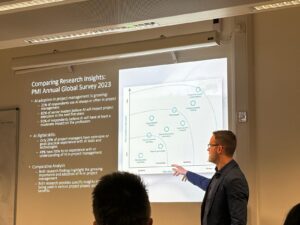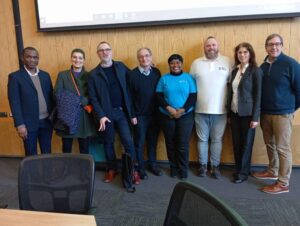Introduction
In the ever-evolving field of project management, continuous learning and adaptation are not just advantageous—they are essential. Recognizing this imperative, the Project Management Institute UK (PMI UK) has been at the forefront of offering cutting-edge educational events designed to prepare the next generation of project managers for the complexities of the modern professional environment. Two standout examples of this commitment are the Project Management Day events held at the University of Sussex and the University of Bradford.
These events were not mere academic exercises but immersive experiences designed to bridge the gap between theoretical knowledge and real-world application. They offered a unique platform for students, practitioners, and academics to converge, share insights, and explore the latest trends and challenges in project management, particularly the impact of technological advancements like Artificial Intelligence (AI).
As we delve into the specifics of each event and the insights gleaned from post-event surveys, it becomes clear that these gatherings were more than just educational opportunities—they were catalysts for change, inspiration, and professional growth. Let’s explore how each event unfolded, the transformative learning experiences they offered, and the actionable insights derived from comprehensive survey analyses.
University of Sussex Project Management Day

The University of Sussex Project Management Day, orchestrated by PMI UK, became a nexus for the confluence of future project managers, seasoned practitioners, and academia, all united by a keen interest in employability within the project management realm. The event was particularly noteworthy for its spotlight on Artificial Intelligence (AI) with Dr. Nicholas Dacre’s compelling discourse on navigating the AI revolution, a theme that resonated with PMI UK’s broader initiatives. This, coupled with real-world experiences and actionable guidance from Sussex alumni, not only enriched the dialogue but also cemented the day’s focus on practical employability paths. It served as a vibrant platform for fostering connections within the Sussex project management ‘family’, inspiring students to explore innovative trajectories in their professional journeys.

University of Bradford Project Management Day

At the University of Bradford, the Project Management Day unfolded as a cornerstone of the Career Booster week, engaging over 700 students in a comprehensive exploration of the project management field’s current and future landscape. PMI UK delivered an enlightening series of workshops that delved into the integration of AI, the agility offered by ‘Wagile’ methodologies, and the indispensable nature of power skills such as leadership and emotional intelligence in today’s fast-paced environments. This event stood out for its hands-on approach to dissecting project management complexities, emphasizing innovation and adaptability. Participants left not just with a deeper understanding of project management’s evolving demands but with a renewed zeal for embracing PMI certifications and the continuous learning journey.




Survey Analysis and Insights
The surveys conducted following the Project Management Day events at the University of Sussex and the University of Bradford have offered invaluable insights into the participants’ experiences, highlighting both the events’ strengths and areas for future enhancement. Key findings from these surveys reveal a high level of satisfaction among attendees, with average ratings for overall event quality, engagement, and the ease of joining hovering around 4.7 to 4.8 out of 5. This indicates not only successful event execution but also a strong alignment with participants’ expectations and professional interests.
At the University of Sussex, the emphasis on Artificial Intelligence (AI) and its implications for project management was particularly well-received. This focus resonated with attendees’ aspirations to integrate cutting-edge technology into their practice, underscoring the importance of keeping pace with rapid technological advancements. The networking opportunities and insights into PMI certifications offered at the event were also highlighted as significant benefits, pointing to a keen interest in career advancement and professional development within the community.
Conversely, the University of Bradford event showcased a broader spectrum of topics, from the integration of AI and neuroscience in project management to the cultivation of power skills such as leadership and emotional intelligence. The diverse content delivered through workshops underscored the multifaceted nature of project management and its evolving demands. Feedback from this event underlined the value of such comprehensive approaches to professional education, with attendees expressing a heightened interest in pursuing project management careers and PMI certifications.
Across both events, the call for future topics revealed a community eager to explore more about AI’s role in project management, technical requirements, and the soft skills necessary for success in the field. This feedback is instrumental in guiding the planning of subsequent events, ensuring they continue to meet the needs and interests of the project management community.
The detailed survey analysis has thus highlighted a clear trajectory for future project management education initiatives: a blend of technological proficiency with essential human skills. By addressing these focal areas, PMI UK’s university events can continue to play a pivotal role in preparing aspiring and current project managers for the challenges and opportunities of a rapidly changing professional landscape.


